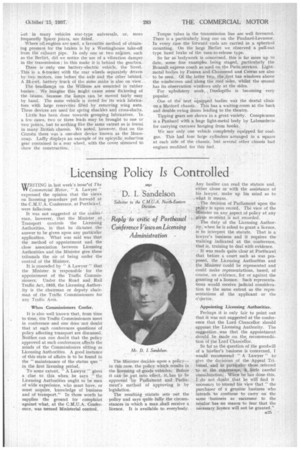Licensing Policy Is Controlled
Page 53

If you've noticed an error in this article please click here to report it so we can fix it.
D. I. Sandelson
Solicitor to Me C.M.U.A. North-Eastern
Reply to critic of Porthtawl Conference Views on Licensing Administration
WRITING in last week's issueof The W Commercial Motor, " A Lawyer" expressed the opinion that the views on licensing procedure put forward at the C.M.11.A. Conference, at Porthcawl, were fallacious.
It was not suggested at the confer: erica, however, that the Minister of Transport controls the Licensing Authorities, in that he dictates the answer to be given upon any particular application. What was said was that the method of appointment and the close association between Licensing Authorities and the Minister give these tribunals the air of being under the control of the Minister.
It is conceded by "A Lawyer" that the Minister is responsible for the appointment of the Traffic Commissioners. Under the Road and Rail Traffic Act, 1933, the Licensing Authority is the chairman or deputy chairman of the Traffic Commissioners for any Traffic Area.
When Commissioners Confer.
It is also well known that, from time to time, the Traffic Commissioners meet in conference and one does not doubt that at such conferences questionS of policy affecting transport are discussed. Neither can one doubt that the policy approved at such conferences affects the minds of the Commissioners sitting as Licensing Authorities. A good instance of this state of affairs is to be found in the " maintenance of the status quo " in the first licensing period.
To some extent, " A Lawyer " gives a clue to this when he says " the Licensing Authorities ought to be men of wide experience, who must have, or must acquire, knowledge of business and of transport." In those words he supplies the ground for complaint against what, at the C.M.U.A. Conference, was termed Ministerial control.
The Minister decades upon a policy— in this Lase, the policy which results in • the lieenSieg a goods vehicles: Before it can be _put into, effect, it, has to he approved 'by Parlialnent and Parliament's method of approving is by legislation.
The resulting statute sets out the policy and says quite fully the circumstances in which a man shall receive a licence. It is available to everybody.
Any haulier can read the statute and, either alone or with the assistance of his lawyer, make up his mind as to what it means.
. The decision of Parliament upon the peilicy is upon record. • The view of the Minister on any aspect of policy at any given moment is not recorded_
The duty of the Licensing Authority; when be is asked to grant a licence, is to interpret the statute. That is a lawyer's business and it requires the training indicated at the conference, that is, training to deal with evidence.
It was made quite clear at Porthcawl that before a court such as was proposed, the Licensing Authorities and the Minister could be represented and could make representations, based, of course, on evidence, for or against the granting of a licence. Such representations would receive judicial consideration to the same extent as the representations of the applicant or the thjector.
Appointing Licensing Authorities.
Perhaps it is only fair to point out that it was not suggested at the conference that the Lord Chancellor should appoiut_ the Licensing Authority. The suggestion was that the appointment should be made on the recommendation of the Lord ChanOelIor.
So far as the question of the goodwill of a haolier's business is concerned, I would re&minend " A Lawyer" to give the decisions of the Appeal Triburial,and in partiMilfir those referred 'to. at the conference; a little careful consideratiou, When he has donethis, do not doubt that he will find it necessary to amend his view that "the purchaser of a genuine business who intends to continue to carry on the seine business as successor to the vendor has eio reason to fear that the nec.eesary licence will not he granted."




































































































